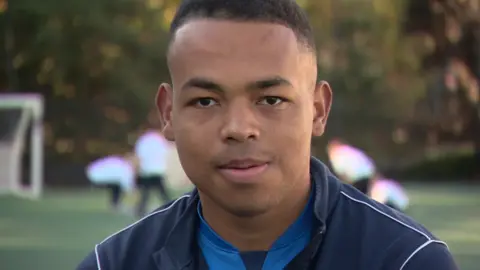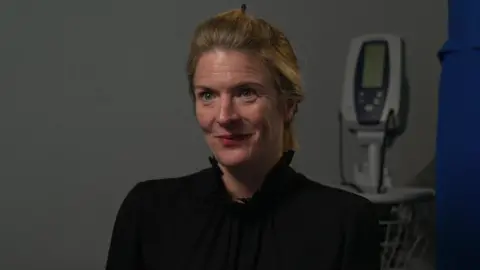'They thought I wouldn't live but I'm here today'
 BBC
BBC"When I was born my parents got told that I wouldn't live [...] obviously I'm here today.”
Johnny Byamungu, from Hounslow, west London, was born with a rare kidney condition called Prune Belly Syndrome and after years of poor health, it eventually meant he needed a kidney transplant when he was 16.
Now 20 years old, the sports coach – a job he never thought he’d be doing – tells BBC London during a training session for first year pupils at Marshgate Primary School in Richmond he is “lucky to be here today”.
Under the “pairing” system run by the UK Living Kidney Sharing Scheme, his mum donated her kidney which was given to another family, while Johnny received one from another donor.
"It was the best thing you can get because I was looking at my future and no-one wants to be stuck in that position - on dialysis, having to go to hospital three times a week - it's not ideal for anyone,” he says.
“I wouldn't be able to teach like I do now, or anything. So getting that call was a real gift, it was amazing."
Prune Belly Syndrome, also known as Eagle-Barrett syndrome, is a rare condition which only affects boys, according to Contact, a disability charity.
For those with the serious condition it causes the poor development of the abdominal muscles and urinary tract problems among other symptoms.
After his kidney transplant, Johnny was eventually able to get back to playing football and was selected for this year's Transplant World Cup to represent England - where they came third.
"To be back playing the game I love is amazing,” he says.
“The dream for everyone I think is to represent their country but to finally do it was amazing, a great opportunity."

Watching his progress in that tournament was his medical team, led by Dr Emma Salisbury who runs the Young Adult Kidney Clinic at Hammersmith Hospital.
She says: "Johnny is an amazing guy, thanks to his parents, thanks to who he is. But for me he represents everything that I wish for all our young adult patients.
“He's been dealt a rough deal in life and I know there have been moments of doom and gloom - how could you not feel sorry for yourself, but Johnny has just got up and taken every opportunity that has been given to him and run with it.”
“He's never let his kidney condition hold him back," she adds.

Dr Salisbury's clinic has about 100 ongoing patients at any given time aged between 16 and 24 - aiming to be a bridge for young kidney patients as they move from children’s to adult services.
"It would be much easier for me to wrap them up in cotton wool, tell them they have to come to clinic and not do anything that would be risk taking,” she says.
“But that's not what I want for them. Feeling sorry for them doesn't help them, empowering them does.”
Listen to the best of BBC Radio London on Sounds and follow BBC London on Facebook, X and Instagram. Send your story ideas to [email protected]
